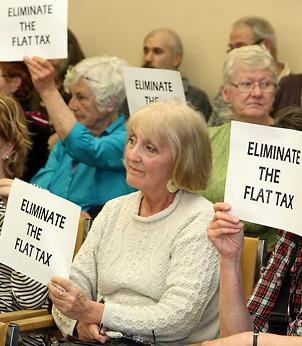Although City of Powell River’s council chambers were dotted with small placards urging council to rid homeowners of the city’s flat tax, the increment of its elimination will remain unchanged.
At the Thursday, May 7, council meeting, council voted to continue reducing the flat tax at five per cent per year, based on the 2010 tax year, which is when the reductions began.
During debate, Councillor Maggie Hathaway moved that the flat tax be decreased by five per cent per year, which is 75 per cent of the 2010 rate. She also moved that Resolution 15-49, stipulating that the flat tax for the 2015 residential property taxes be set at 70 per cent of the 2010 rate, be rescinded. Resolution 15-49 had been passed at the March 5, 2015 council meeting. At a 10 per cent reduction, it would have meant that Powell River’s flat tax would be eliminated in seven years, rather than in 2030, which is the time span required to phase out the tax by reducing it five per cent per year.
Councillor Russell Brewer, chair of the city’s finance committee, said the matter had been discussed extensively, plus, based on all the feedback received from two open houses and other input, he said he supported Hathaway’s motion as a good compromise.
Hathaway said she concurred. “We’ve beaten it to death so this is a good compromise,” she said. “We can just move on.”
Councillor Karen Skadsheim said she’d like to see the city’s flat tax gone, but reducing it too quickly could create hardship. For example, most of the properties in Powell River assessed at more than $1 million are apartment buildings housing residents with modest incomes. These properties are the ones most substantially affected by the elimination of the flat tax, which will shift greater tax onus to the higher-end properties.
“I’m okay with this compromise,” Skadsheim said.
Acting Mayor Rob Southcott said he wished to go on record, stating that his feeling is the flat tax was introduced many years ago to address a global issue that has since been resolved.
“We are certainly in the minority of communities in British Columbia that retain this flat tax,” he said. “In my extensive research and discussion, with many people in this community, it’s a very divisive issue, but it involves many smaller, more specific issues.”
Southcott said he would have endorsed the 10 per cent reduction in flax tax from the 2010 baseline.
The motion carried, with Southcott opposed.



